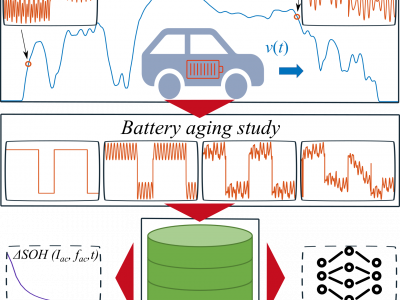Batteries

This dataset is created by an experimental setup of a DC-PV -Battery-based grid-connected distributed generation system. This dataset is split into four parts such as irradiance, and temperature, which were measured by a meteorological station, and lastly, PV output current and voltage acquired by an inverter. Furthermore, we can have a chance to obtain the output PV power by multiplying current and voltage. The dataset has 288 elements for one day as a time series since the station obtains the data within five minutes. However, the whole dataset has three days of data with 864 elements.
- Categories:
 357 Views
357 ViewsThe SiCWell Dataset contains data of battery electric vehicle lithium-ion batteries for modeling and diagnosis purposes. In this experiment, automotive-grade lithium-ion pouch bag cells are cycled with current profiles plausible for electric vehicles.
The analysis of current ripples in electric vehicles and the corresponding aging experiments of the battery cells result in a dataset, which is composed of the following parts:
- Categories:
 4479 Views
4479 ViewsThe data provided here correspond to the TPWRS paper presenting a novel filter design procedure to optimally split the Frequency Regulation (FR) signal between conventional and fast regulating Energy Storage System (ESS) assets, considering typical Communication Delays (CDs). The filter is then integrated into a previously validated FR model of the Ontario Power System (OPS) including Battery and Flywheel ESSs, which is used to analyze the impact of these ESSs, CDs, and limited regulation capacity in the FR process in a real system. The proposed methodology to split the
- Categories:
 369 Views
369 Views
When batteries supply behind-the-meter services such as arbitrage or peak load management, an optimal controller can be designed to minimize the total electric bill. The limitations of the batteries, such as on voltage or state-of-charge, are represented in the model used to forecast the system's state dynamics. Control model inaccuracy can lead to an optimistic shortfall, where the achievable schedule will be costlier than the schedule derived using the model.
- Categories:
 548 Views
548 Views
